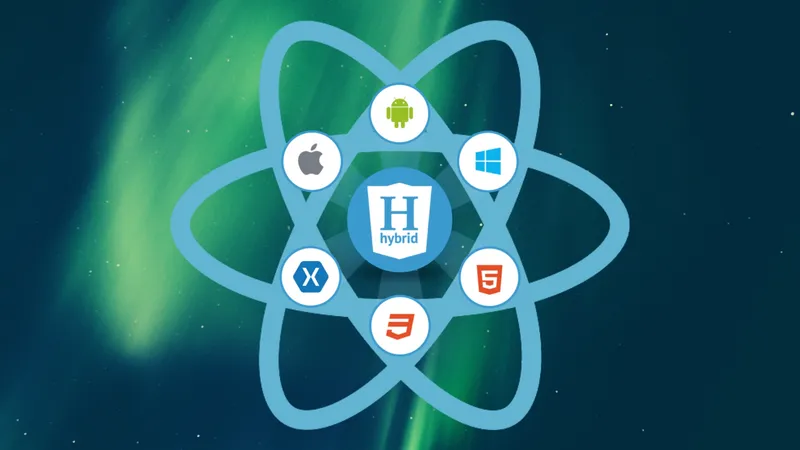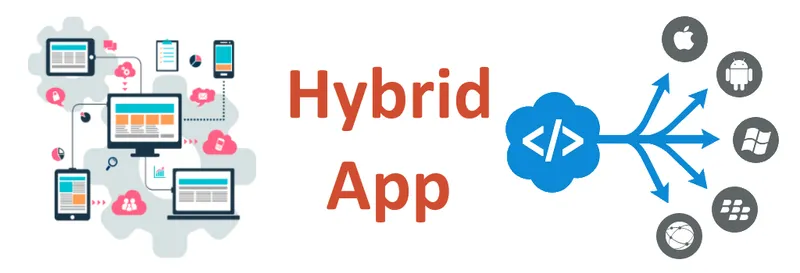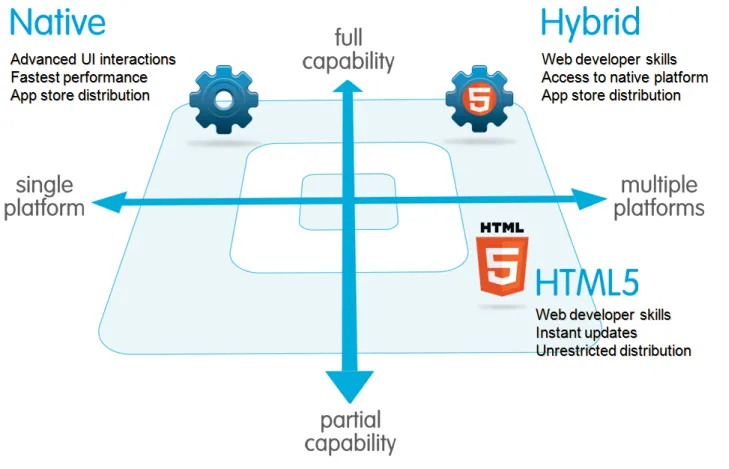

Business Interests In 2019 With Hybrid App Development

Nowadays, Entrepreneurs, as well as business owners, want to have his/her own website & App by partnering with a hybrid app development company. Careful planning and strategic technology decisions will help to ensure the successful launch and encourage the adoption. The user interface (UI), experience (UX), and desired functionalities all have to be considered before settling on a platform. Afterwards, an appropriate development process should be implemented.
Whether, the app will be native or cross-platform will determine a lot. The app’s preferred platform and programming language play a huge role in how intuitive the product is to users, as well as the type of audience that will primarily use the app.
WHAT IS HYBRID APPLICATION?
Let’s start with a brief background: native applications are built using a platform-specific programming language (Objective-C for iOS and Java for Android) and can use all native functionality of mobile devices and mobile operating systems, including the use of GPS, access to the file-system, or common user interface elements. As a result, they usually have a consistent user experience, offer great performance, and are tied to just a single environment they were developed for.

One could say that hybrid applications actually have more in common with web apps than native apps. The reason is that they are actually just web apps wrapped in a native web view displayed via the smartphone’s native browser. What makes them so special is the particular framework using which they are built. This framework allows for an easy use native functions of each mobile platform using cross-platform APIs. Frameworks like Cordova require nothing more than a knowledge of HTML, CSS, and JavaScript, tools which are very familiar to all web developers.
Here are the reasons why you should choose hybrid app development for your business:
- Reduced Development Costs: Building a hybrid mobile app is relatively cheaper and gets the task done sooner than any native or web mobile app. In the fiercely competitive digital era where ‘time to market’ has become critical than ever, cost efficiency plays a vital role in helping enterprises build and get their product to the market in no time. With the help of a set of libraries and various development frameworks such as Xamarin and Phone-Gap, hybrid app developers can accelerate the development process and submit the app to various app stores to apparently save both time and cost.
- Improved UI/UX: A consistent user experience across multiple mobile platforms is one of the main reasons behind the hybrid app’s popularity. Users expect the app to be instantly responsive to different devices and deliver a glitch-free experience. Hybrid apps are based on the idea of “information is just a tap away”. And while it displays data faster and adjusts to different device screen configurations immediately, it also resolves the issues of the fluctuating data streaming capabilities. Being lightweight, the hybrid app UI can also load the high-definition graphics and content quickly.
- Ease of Integration: Like native apps, hybrid apps leverage the device’s internal programming system through an overlay which helps to enable seamless synchronisation with other compatible apps. This reduces the integration issues for developers. In turn, the hybrid apps work well with the device’s native applications such as camera, messaging, GPS, etc. to ensure a smooth user experience.
- Offline Support: Hybrid apps store the device’s API to save offline data that helps to load the application quickly. It partially stores information that the users can access at the time of poor or no connectivity. Since a majority of users want to reduce their mobile data consumption and have uninterrupted access to app’s data, a hybrid app is capable of providing just that — offline app accessibility without performance glitches. It is one of the primary reasons why hybrid mobile apps are the best when compared to native mobile apps.
- Simplified Maintenance: Unlike a web application, a hybrid app is designed to make use of all the features available in the mobile device. Though native apps also utilise all the device features, maintaining it is quite a challenge for users and developers alike. Developers have to roll out new updates in the form of new versions and users are required to update the app every time a new version is launched. A hybrid app bypasses versioning and makes app maintenance as simple as updating a web page, that too in real time. This level of flexibility further facilitates the scalability needs of an enterprise.
- Speed: Hybrid apps are faster when compared to native and mobile web applications. The technology and framework used in the hybrid Mobile App Development are the reason behind its speed. With hybrid mobile apps, you don’t have to reload the app data often and you can access the app even with poor Internet connectivity. It will only get slow when the app requires animations and HD graphics.
- Availability: A hybrid mobile app can be uploaded on different mobile platforms such as on App Store for iOS, on Google Play Store for Android, etc. As a business, you can easily reach your target audience with the use of hybrid mobile apps.
- Scaling: Hybrid apps are cross-platform applications which are designed and developed for different platforms and operating systems. In comparison to native and mobile web apps, hybrid applications are quite easy to scale and develop. Moreover, developers can reuse the code across multiple platforms.

Conclusion
A mobile app is an imperative tool for every enterprise to penetrate the market quickly and stay competitive. And a hybrid app solution makes this task a whole lot easier and faster. Giants like Uber, Twitter, and Instagram have already leveraged the advantages of hybrid mobile app development. If you too are looking to capitalise through a hybrid app of your own, connect with our experts now to discuss the requirements.






